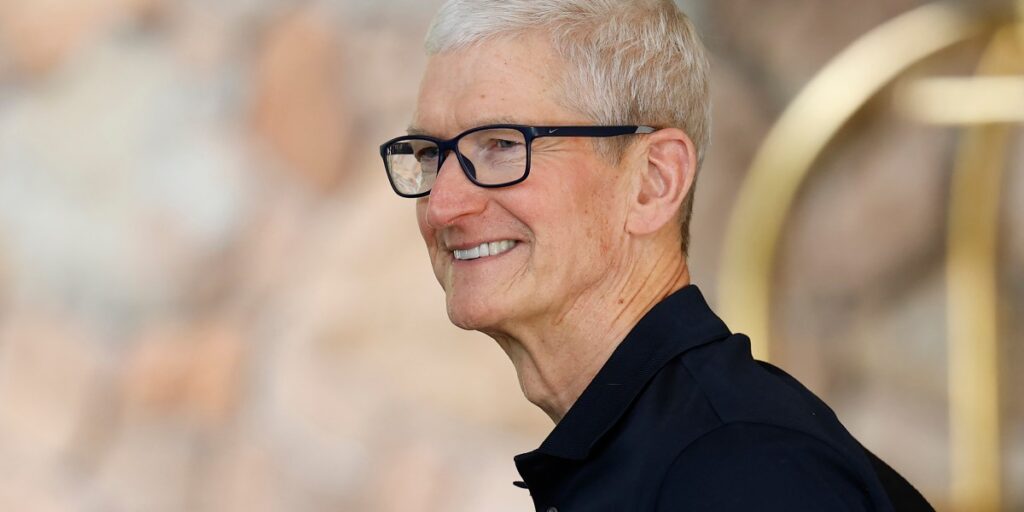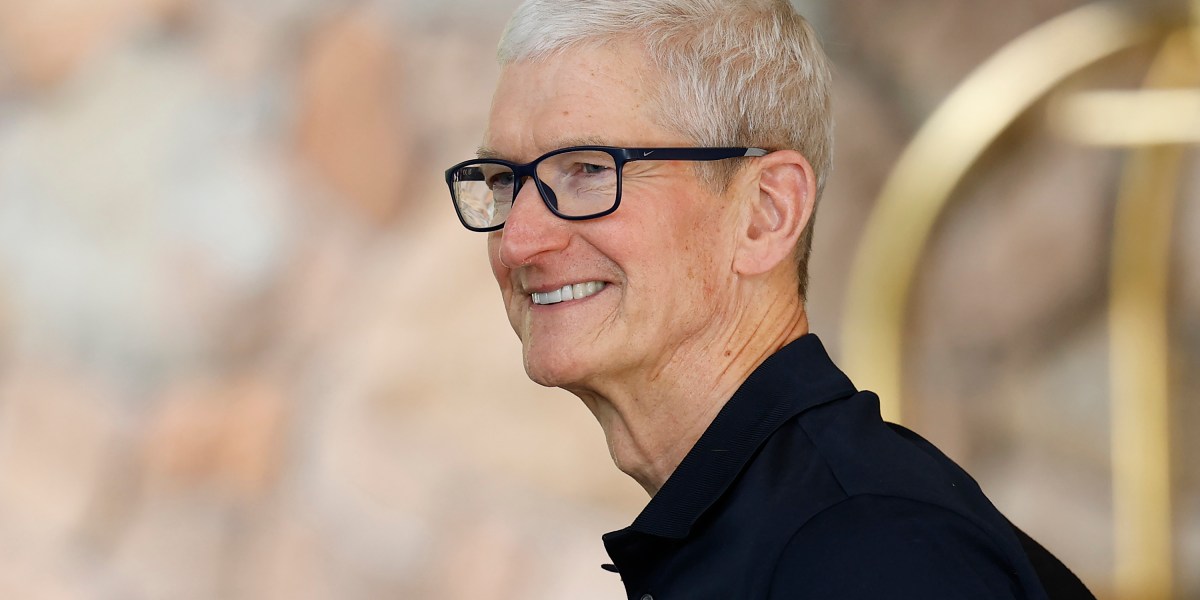Apple’s Tim Cook is under pressure—but there are a few key reasons leadership experts think he’s still the guy for the job
Looking at the big picture, some experts say Cook might remain CEO for years—and that might be the best course for Apple.


Is it time for Apple CEO Tim Cook to clean out his office? You might think so after the past few weeks. But top experts on CEO successions counsel settling down and looking at the big picture. It shows why Cook might remain CEO for years and why that might even be the best course for Apple.
The recent depressing news included a top Apple AI executive’s defection to Meta just weeks after another high-level AI researcher had left—especially painful because Apple is widely seen as a laggard in the world’s hottest technology, AI. Last month Apple’s annual Worldwide Developer Conference, often a scene of breathtaking new products or services, was “a snoozer,” said Wedbush analyst Dan Ives. While stocks of Microsoft and Alphabet are hitting new highs, Apple is down 16% this year.
Little wonder that a Wall Street research firm, Lightshed, concluded Cook is no longer the right boss for Apple. The company “now needs a product-focused CEO, not one centered on logistics,” the firm wrote. “AI is not something that Apple can merely ‘pull the string’ on. Missing on AI could fundamentally alter the company’s long-term trajectory and ability to grow at all.”
By earlier standards, Cook would have been on his way out in any case. In August he will have been CEO for 14 years, and in November he turns 65. But 65 is nothing special anymore, and no board of directors will hurry to dispatch a CEO who created far more shareholder value than his legendary predecessor, Steve Jobs, ever did. At least in theory, the options for Cook and the board are wide open.
So what should Cook and the board do? To get an authoritative answer, Fortune recruited three eminent executive search experts, each of whom has counseled scores of major boards on managing successions. We agreed to withhold their names so that they could speak completely candidly. Here are their combined thoughts—as well as the final word from preeminent business historian Richard Tedlow, who gives a compelling comeback to anyone who thinks Cook’s time is up.
Apple’s competitive environment now. “Two things are happening in parallel. One is AI, which is a much bigger deal than the internet was. The second thing is the evolution of the hardware. There’s a ‘good enough’ problem. For most users, the phones are good enough. I’m a power phone user, and I use a several-year-old iPhone because there’s no compelling reason to upgrade. Those two things in combination make for a more challenging environment for Apple.”
At the same time, the consultants see a temporary upside for Apple. “They don’t have the existential threat that Google has from AI. Apple still has the platform—I’m still using my Apple phone to reference ChatGPT. They’re not losing revenue in that exchange. So if you look at where they make money, they actually don’t need a quick entry [into AI].”
“Remember, Apple has never been first to market with anything. They’re considered to be the most innovative company in the world, but they have largely taken a concept that’s been proven and made it applicable for use in ways that are highly innovative and esthetically appealing.”
Still, the clock has been ticking for a while. “I would be shocked if within the next 12 months they do not release a truly functioning baseline agent to replace Siri.”
When might Cook be thinking of stepping down? “That’s really the foundational question. If it’s two years, are there any outsiders who could plausibly come in? Are there any boomerang people who could come back from outside of Apple?”
“Apple is less likely to go outside because of the cultural history of outsiders at Apple. It’s almost revered, the story of how outsiders almost killed Apple [before Steve Jobs returned in 1997]. We hear pretty consistently that Cook is thinking of an age 68 to 70 timeline [which would be three to five years from now.] He feels that, with AI, there’s some unfinished business.”
“I don’t think Tim will be CEO until he’s 70. I think he’s tired, honestly. It’s been an exhausting journey, and he’s amazing, but I do sense a different energy.”
What kind of executive will Cook’s successor be? “The common wisdom is that they really need a product visionary, as opposed to the operational genius that he was. I would argue that until the tariff and supply chain issues get resolved, they probably do need him at the helm because that is a non-trivial issue for them.”
Who are the leading candidates to succeed Cook? “The most obvious are John [Ternus] and Craig [Federighi].” Ternus is senior vice president hardware engineering. Federighi is senior vice president software engineering. “But given the timeline, [the company] could still make quite a few changes, and it could be somebody quite different.”
“There are a few companies where being a CEO is really like being the president of a country, and Apple is one of those. There are maybe a dozen. It sounds kind of heretical to say, but to some degree, the smaller part of the job is effectively operating the company.”
Bottom line, what is the big-picture assessment of Tim Cook? For this we turn to a business historian, Richard Tedlow, an emeritus professor at the Harvard Business School. Like any good professor, he asks questions. He starts by asking five crucial questions about Apple: Does it satisfy customers? Does it come from behind? Does it have a powerful corporate culture? Is it willing to admit mistakes? Does it have “an imagination of disaster,” a realization that things could go badly wrong? Approvingly, he answers Yes to all. Told that a Wall Street research firm has said Cook should resign, Tedlow notes that Warren Buffett invited Cook to Berkshire Hathaway’s annual meeting in May and said, “I’m somewhat embarrassed to say that Tim Cook has made Berkshire a lot more money than I’ve ever made [for] Berkshire Hathaway.” Tedlow asks, “If that Wall Street firm called Buffett and said, ‘Warren, do you think it’s time to get rid of Tim Cook,’ what do you think Warren would say?”
Tedlow’s ultimate query: “If you could choose anybody to be the CEO of Apple right now—anybody in the whole history of business, from John Jacob Astor to John D. Rockefeller to Tom Watson Sr. to Andy Grove to Tim Cook—whom would you choose? This is actually not a difficult question.”








